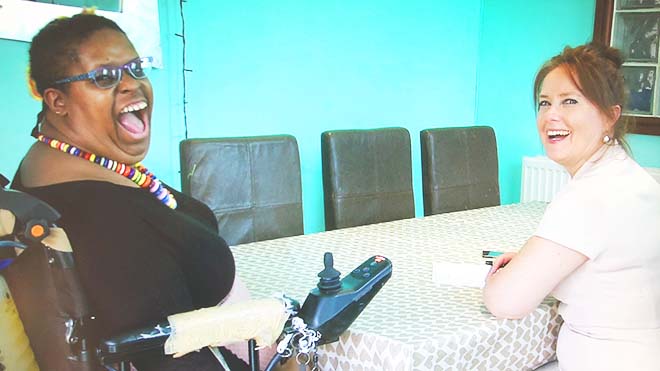

We can help protect and manage your compensation.
Managing large amounts of compensation is complicated. We understand how to make the most of compensation to meet your needs and to keep it safe.
Your hard won compensation is your lifeline. Together we can manage and protect it.
The future is uncertain, together we can navigate it.
It is vital to safeguard compensation. Many individuals who receive large injury payments can no longer work and are dependent on it for every aspect of daily living and care. The compensation often needs to last a lifetime. When you or your family need us, we will be by your side for every step of that journey.
We use the compensation to ensure you optimise your quality of life and appoint specialist independent financial advisors to invest wisely. We ensure that other income streams like benefits and statutory funding are maximised. We are here to make the compensation go as far as possible, for as long as you need it.
Compensation protection appointments fall into two categories. But the way we treat every single client is as unique as your circumstances:
• If the individual has capacity to manage their financial affairs they can establish a personal injury (PI) trust with the appointment of a professional trustee and lay trustees.
• If the individual does not have capacity, then they come within the jurisdiction of the Court of Protection and require the appointment of a professional deputy.
- Over 50 years of experience
- We build a Team Around the Client
- Lifelong legal companion
We create a Team Around the Client in partnership with the family and professionals, including therapists, case manager and an Independent Financial Advisor. This multi-disciplinary team is focused on optimising the compensation so that it supports the client’s quality of life for his or her lifetime and empowers them to lead as independent a life as possible.
How we help clients who have capacity
Receiving compensation for your injury can seem like the end of the road, but what about the future? The compensation you receive can lead to a reduction in means tested benefits unless it is held within a Personal Injury (PI) Trust.
You are entitled to a grace period of 52 weeks from when you first receive a payment in relation to your injury; during which time it can be spent before these funds will count in a means test assessment. It is important to note this grace period only applies to the very first payment received, and will include payments from an insurance policy. After this time, or when further payments are received, it is important for the funds to be held in a PI trust.
A PI trust is a legal agreement known as a trust deed which names two or more people or a Trust Corporation (known as Trustees) to look after your compensation for you. When the money is placed into a PI trust it becomes known as your trust fund.
Typically it is a bare trust: the money is still yours and it can be used to pay for the things you need such as a car, care, therapy or other everyday living expenses, but because it is held in the trust it is separate from your own funds. This means you can still claim means-tested benefits, such as Universal Credit or Employment Support Allowance.
Your trustees will need to agree to any purchases made using the trust fund, so it is important that you chose the right trustees to manage funds for you.
RWK Goodman acts as professional trustee through our Trust Corporation, Withy King Trustees Limited. An individual director will be nominated to work closely with you to ensure the money in the trust is used for your benefit. The normal vagaries of life mean that you are likely to experience many changes over your lifetime (often heightened by your injury); involving a professional can help you navigate the decisions by relying on our extensive experience and knowledge to make the right decisions for and with you.
We will additionally work with you to consider life planning, advising in respect of appointing attorneys for your finances (funds outside the trust), appointing attorneys for your health and welfare, and on making a will.
How we help clients lacking capacity to manage their financial affairs
When an individual lacks capacity to manage their financial affairs due to an injury, a deputy will be appointed by the Court of Protection to manage their finances for them.
The legal process that goes into determining capacity all stems from The Mental Capacity Act 2005. This Act also provides a detailed framework that is designed both to empower and protect vulnerable people; the philosophy behind the legislation being that those who suffer a disability shall be assisted to live normal lives and make as many choices about their lives as possible.
Section 2 of the Mental Capacity Act sets out the definition of capacity as:
“a person lacks capacity in relation to a matter if, at the material time, he is unable to make a decision for himself in relation to the matter because of an impairment of, or a disturbance in, the functioning of, the mind or brain”.
The matter of whether someone has capacity is therefore individual, time and issue-specific.
The five key principles when determining capacity
It is also important to have in mind that the Act is very much intended to enable incapacitated people and (as Section 1 of the Act requires) the following five guiding principles apply:
- a person must be assumed to have capacity unless it is established that he lacks capacity;
- a person is not to be treated as unable to make a decision unless all practical steps to help him to do so have been taken without success;
- a person is not to be treated as unable to make a decision merely because he makes an unwise decision;
- an act done, or decision made, under the Act, for or on behalf of a person who lacks capacity must be done, or made, in his best interests;
- before the act is done, or the decision is made, regard must be had to whether the purpose for which it is needed can be as effectively achieved in a way that is less restrictive of the person’s rights and freedom of action.
Before incapacity can be determined, Section 3 of the Act sets out that it is necessary to show that the individual is unable:
“(a) to understand the information relevant to the decision;
(b) to retain that information;
(c) to use or weigh that information as part of the process of making the decision; or
(d) to communicate his decision (whether by talking, using sign language or any other means)”.
How deputies should help to make decisions for someone who lacks capacity
Making a decision in the best interests of the incapacitated person is a principle enshrined in the Mental Capacity Act. Whilst there is no definition of “best interests” there are guidelines of what to consider when deciding what these might be. These guidelines are set out in Section 4 of the Act.
First and foremost, the deputy must consider all relevant circumstances and, “so far as reasonably practicable”, permit and encourage the individual and appropriate others (family, carers) to be involved in the decision-making process. A Code of Practice is also set out in the Act, and deputies have a legal duty to follow this code; paying close attention to the five statutory principles (mentioned above) when making decisions.
Furthermore, all deputyship orders make it quite clear that, although they may have wide powers to manage all of the person’s financial affairs, under no circumstances can a deputy make a decision on a matter where the individual has the capacity to make his/her own decisions. To do so would be to render the deputy’s decision invalid.
How it works in practice
In practice, the deputies must meet with an individual, analyse and reflect on whether they can make the decision themselves and, if not – taking into account the circumstances and views of the individual and those close to them – make a best-interest decision. This process can be complex and requires proper time allocated to it. We are experienced in supporting brain injury survivors to participate in financial decisions, and understand the importance of taking time during meetings, and using prompting and visual aid techniques, to ensure as far as possible that clients and their families are supported and involved in discussions.
In our experience, some individuals will lack capacity concerning all of their financial affairs but others retain some capacity. It is for the deputies to establish the areas of capacity and the extent to which the client can make decisions themselves, and ensure that they do not trespass there. This requires time to be spent getting to know the client and developing a trusting relationship.
A deputy is authorised to deal with all aspects of finances including paying utility bills, employing a care team, buying a house and managing funds received in settlement of a claim for injury and benefits.
Where an individual has a significant claim for compensation, the Court of Protection’s preference is for a professional deputy to be appointed to manage the funds. This permits family members to focus their energies on supporting the injured person as their partner/parent/sibling/offspring. If litigation is ongoing, the costs of a professional deputy will be included as a head of loss in the litigation claim.
We act as Deputy for a number of clients through our Trust Corporation, Withy King Trustees Limited. We take an individualised approach ensuring clients build a trusted relationship with one Director of the trust corporation who essentially acts as the deputy. The trust corporation structure however allows us to ensure that client’s needs are still met if that individual director is unable to make decisions due to a holiday or sickness. We also have a team working approach to ensure that clients can always speak to someone who is familiar to them, even when the directors are unavailable.
In the Compensation Protection Unit we work closely with our client and their family to build a strong and lasting relationship with them and the other professionals including case managers, therapists and financial advisors. We believe that in working together as a team we can provide optimum legal advice and support for our clients, ensuring decisions are made in their best interests to produce the right outcome for them.
Using our Team Around the Client approach we understand that decisions around finances are integral to our client’s lives and that only through a collaborative approach with our clients, their families and the other professionals in their lives can we really understand our client’s needs. We recognise that all our clients are individuals and their circumstances, and consequently their needs, are individual. Our experience allows us to provide expert support whilst ensuring our approach is tailored to each individual and we focus on what is important to each client.
The individuals in the CPU who make up the professional deputy team have extensive experience in supporting clients and their families throughout the claims process and post settlement. The first few years after a claim is settled can often be challenging as clients finally have the funds to enable them to adapt and optimise their life, such as to buy and convert a property. We recognise the increased pressure this can place on our clients and their families and are here to provide expert support. We also understand that some individuals will want to increase their independence and we work with those clients to provide a budget which they can personally manage.
Withy King Trustees Limited- Trust Corporation
We established a trust corporation nine years ago named Withy King Trustees limited (WKTL). The mechanics of the trust corporation are such that, whilst WKTL is appointed the professional deputy or trustee, a named director will be the custodian and has the personal relationship with the client and family.
A particular advantage of WKTL is that if a director is on holiday or unwell, another director is immediately available to execute decisions for the client, ensuring speed of response so as to prevent any unnecessary delays.

Team Around the Client Magazine
Read the latest edition of our Team Around the Client Magazine today.
In this edition of Team Around the Client, we are focusing on all things sport and disability. What are the benefits that those living with disability can find when they are able to engage with sport? Find out in our latest edition.
Insight from our legal specialists
View more articles related to Compensation Protection
Where you can find us
We represent clients from across England & Wales, but if you want to come and see us you can find us at the following locations:





















